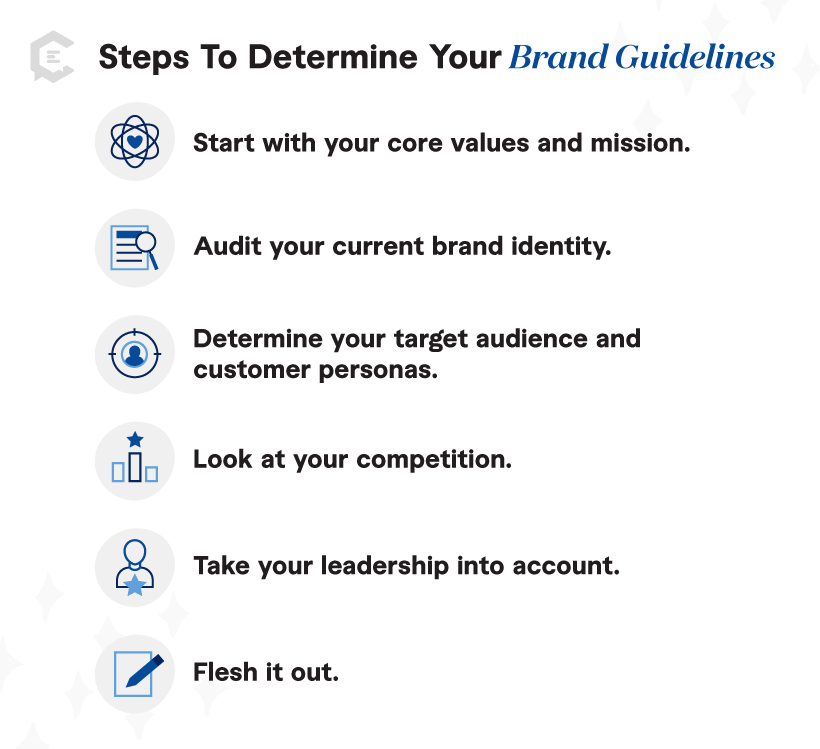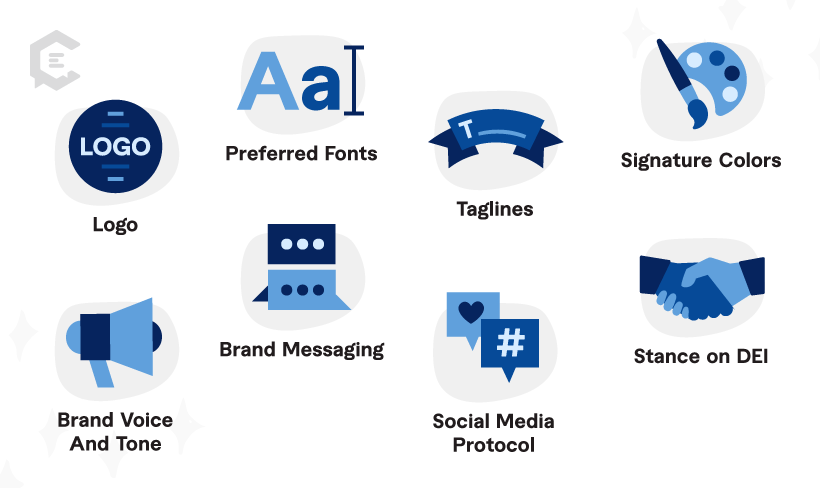What are brand guidelines?
Brand guidelines are the visual and verbal elements that shape and define your brand. When crafted well, they are the components that come together to distinguish your brand from the competition… even if your audience can’t quite put their finger on what they are. Brand guidelines are what make your brand “feel” like your brand.
Your brand guidelines make your brand unmistakeable.
Why are brand guidelines important?
Brand guidelines communicate your brand identity to your audience. And your brand identity is how your customers and potential customers come to know, like, and trust you. Obtaining their trust is the key to building customer loyalty. If your brand doesn’t have an identity – or worse, it’s all over the place – winning over your audience will be an uphill battle.
Having brand guidelines in place ensures that your branding and brand identity are consistently communicated across all platforms, both visually and verbally, no matter who’s creating content for you. And that consistency is what brands like Coca-Cola, Nike, and Apple have capitalized on for decades. (You could just see their brand imagery when you read their names, right?)
How do you determine your brand guidelines?
You’ll first want to start with your brand identity if it’s not currently established and codified. You can define your brand identity with these steps:
- Start with your core values and mission. What is your company’s purpose? What do you stand for? How are you shaping the world? What do you do? How do you do it? And why does it matter?
- Audit your current brand identity. What message are you sending to your audience? And does it align with what you want them to understand about your brand?
- Determine your target audience and customer personas. Who are you trying to reach with your brand?
- Look at your competition. How will you distinguish your brand from what’s already out there?
- Take your leadership into account. Your brand should not only be accessible to your audience but accurately reflect the personality of the team at the helm.
- Flesh it out. Based on these previous steps, can you distill your brand identity into one sentence?
Once you’re feeling confident about your brand identity, you’ll want to create brand guidelines to make sure that your branding is consistent and effective for your audience. Again, this includes visual and verbal elements such as:
Your Visual and Verbal Elements List
Here’s everything you should include in your brand guidelines:
- Logo
- Taglines
- Stance on DEI
- Preferred fonts
- Signature colors
- Brand messaging
- Brand voice and tone
- Social media protocol
Aren’t brand guidelines just a style guide?
Yes and no. Your style guide will be informed by your brand guidelines, but it is only one part of a larger whole. Your brand guidelines provide the WHY behind the WHAT. That may not seem like an important distinction, but at some point – if you’re not already there – you’ll hand off content generation to other members of your team.
Having an understanding of your branding as a whole will help ensure that your brand identity remains consistent, whether you’re creating content in-house or outsourcing your content creation entirely.
When should you use brand guidelines?
Anytime you’re creating something that will represent your company in front of your target audience, you should be consulting your brand guidelines. They should be so well-ingrained that using them becomes second nature. Every piece of content you create should reflect those brand guidelines.
What are some real-life examples of brand guidelines?
Nike
Nike’s brand identity includes its signature “swoosh” logo and the company name in a bold, sans-serif font. The brand’s colors are black, white, and a bright shade of Nike “volt” green.
Nike’s brand voice is confident and aspirational, often using first-person pronouns like “I” and “we.” The company’s slogan, “Just Do It,” perfectly captures the brand’s spirit.
Apple
Apple’s brand identity includes its minimalist logo and the company name in a sleek, modern font. The brand’s colors are black, white, and various shades of grey.
Apple’s brand voice is friendly and helpful, using second-person pronouns like “you” and “your.” The company’s slogan, “Think Different,” speaks to its audience of creative professionals and individual thinkers.
Harley-Davidson
Harley-Davidson’s brand identity includes its bar-and-shield logo and the company name in a blocky, old-school font. The brand’s colors are black, orange, and white.
Harley-Davidson’s brand voice is rebellious and edgy, using first-person pronouns like “we” and “us.” The slogan “Live to Ride, Ride to Live” perfectly captures the brand’s spirit.
Get Started with Your Brand Guidelines
Whether you need to hone your brand identity or generate on-brand content for your audience, ClearVoice has you covered. Talk to a content specialist today and find out how we can work within your brand guidelines to deliver unique, SEO-friendly, and on-brand content for you.









